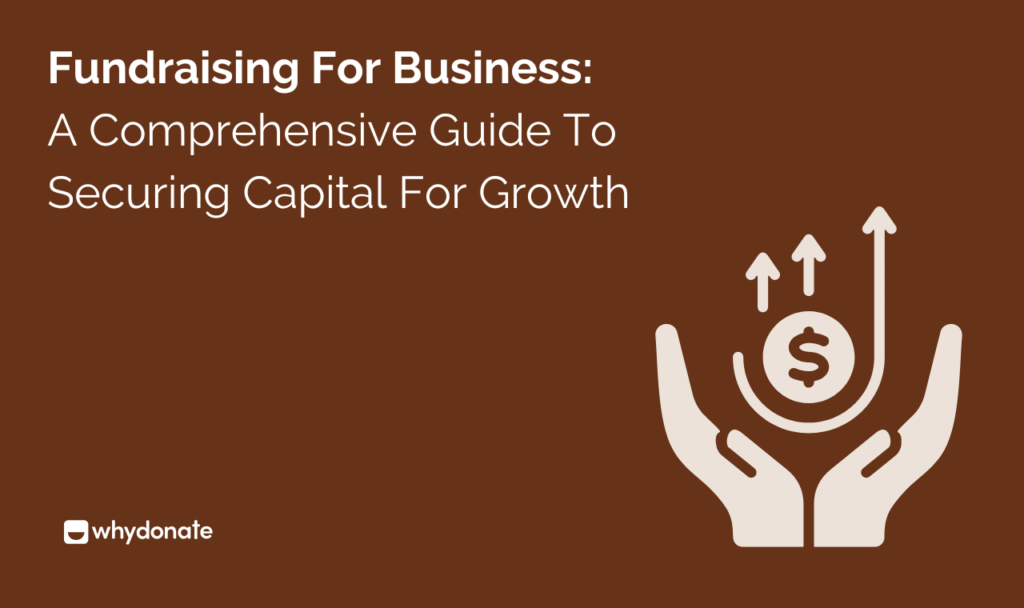In the modern competitive environment of business, getting the perfect financing could be what distinguishes triumph from a halt in movement. Fundraising for business is a very important process that can shape where your new journey goes, especially if you are starting a new company, expanding an existing one, or tapping into new markets. Knowing the funding options available, as well as different methods and successful approaches, will assist you in successfully executing this difficult but fruitful undertaking.
In this comprehensive guide, we will explore the key elements of fundraising for business, including the different types of funding, how to prepare for fundraising, and business fundraising ideas.
Raise Funds For Your Business For FREE & Reach International Donors Today. Start Your Campaign At WhyDonate!

Table of Contents
Why Business Fundraising is Important?
Fundraising is vital for businesses because it provides the financial resources needed to fuel growth, expand operations, develop new products, and enter new markets. Here are some reasons why one seeks fundraising ideas for business:
1. Start-Up Capital
Capital is essential for most entrepreneurs since it helps them turn their concepts into profitable ventures. These funds can be allocated for several purposes, including initial expenditures such as product development costs, marketing expenses, personnel expenses, and other operational costs. This is one of the primary reasons for business fundraising.
2. Expansion And Scaling
Scaling operations, opening new locations, investing in advanced technologies, or entering new markets may require more resources, even for established businesses. Small business fundraising can be a good way to secure funds that are crucial if you want your business to grow without draining your existing cash reserves.
3. Research And Development (R&D)
For many years now, it’s become a common thing in various industries, technology, or pharmaceuticals mostly, that new ideas have to be put into use after extensive research and development. The cost of R&D is usually high. Hence, most firms depend on investors or a business fundraiser for financing this venture.
4. Cash Flow Management
Sometimes, businesses encounter cash flow problems since customers fail to remit payments on time or sales are on a slow trend during certain seasons of the year. These funding shortages can be removed by short-term debt loans or procuring funds for operational capital.

What Are The Best Business Fundraising Ideas?
Numerous forms of raising money exist, all having their own unique strengths and weaknesses. Selecting a fundraising approach is determined by the business level, capital needed, and objectives for the future of the start-up. Here are some influential business fundraising ideas:
1. Crowdfunding
Crowdfunding involves collecting small amounts of money from a lot of individuals, usually through online platforms like WhyDonate. It is an excellent option for business fundraising that want to validate their product with real customers before launching it fully. In addition, crowdfunding also serves as a marketing tool to create buzz about your product.
WhyDonate offers features such as a comprehensive dashboard, multi-currency, custom branding, and so much more that allows your campaign to reach heights.
2. Bootstrapping
Funding your business with personal savings and revenue from early sales is known as bootstrapping. However, this strategy may constrain growth, particularly when a lot of capital is needed to grow the business. Although it calls for extreme financial discipline, bootstrapping enables you to be fully in charge of your company. Compared to other fundraising ideas for small businesses, bootstrapping stands out because it allows entrepreneurs to retain complete ownership without relying on outside investors.
3. Friends And Family
For business fundraising, various entrepreneurs first contact their friends and relatives. Even if it may provide a speedy way of getting cash, the approach may also have risks, such as pressure on personal relationships in case the venture fails.
4. Angel Investors
High as the ‘heavens,’ angel investors are affluent persons who provide funding to small businesses in return for equity. They tend to invest at the onset of firms’ operations and can also offer advice and connections with other investors through their influence in place of capital. But by doing so, there is a possibility you may lose your stake in the company, from which you are used to having complete control over it. Hence, such an unfortunate scenario is likely to happen where the investor has some authority over the running of that enterprise.
5. Venture Capital (VC)
To get equity, high-growth startups receive investments from venture capital firms. However, VC financing usually comes with stringent conditions and rapid growth as a requirement. Venture capitalists tend to always seek high returns, thus pushing the company to grow fast.
6. Bank Loans
For businesses, typical bank loans represent a frequently used way of borrowing money from others. In return, banks earn regular interest payments on top of their advances. This seems appropriate for businesses that have a consistent cash inflow but can be elusive for startups with little financial background. In the U.S., entrepreneurs may also consider SBA loans (Small Business Administration loans), which are government-backed and often come with more favorable terms for small businesses compared to traditional bank loans.
7. Grants
Grants are usually non-refundable money given by the government, non-profit organizations, or foundations to support businesses in specific fields like technology, education, and ecological preservation. Even though applications can be competitive, they serve as a significant source of finance and do not require a payback.
8. Initial Public Offering (IPO)
Two words are synonymous by definition or meaning: initial public offering (IPO) and emergence into public markets. Initial public offering (IPO) refers to an issuance of shares by a company on an exchange market. Established firms can rely on this type of financing to acquire huge amounts of capital since this method is reserved for them only; however, starting as a public entity means enduring thorough legal as well as financial arrangements together with enhanced oversight and rules.
9. QR Code Donations
In the digital world, QR code donations have emerged as a modern, cost-effective, and contactless fundraising method. By simply generating a QR code linked to a digital donation page, businesses can receive donations directly from supporters, whether online or offline.
This method is especially effective for local shops, cause-driven startups, or community brands seeking quick support, funding, or audience engagement.
QR codes can be placed on receipts, product packaging, flyers, posters, websites, and social media posts.
Related: Explore best practices for QR code fundraising in our Scan to Donate blog.

How To Prepare For Business Fundraising?
Before approaching investors or applying for loans, it’s essential to prepare your business for fundraising. Proper preparation not only increases your chances of securing funding but also ensures that you’re ready to meet investors’ expectations. If you’re exploring how to raise money for a business without a loan, these steps are just as important, since investors and alternative funding sources still expect a solid plan and clear financial projections. Here are the key steps to prepare fundraising for business:
- Create A Solid Business Plan: The basis of a successful business fundraising initiative is an inclusive corporate strategy. This must encompass information about your business structure, its intended market, competitors’ situation, expected turnover, and future plans for expansion. A concise, compelling business proposal clearly shows prospective creditors or financiers that there are realistic avenues for prospering in this company.
- Develop Financial Projections: Financial projections should include comprehensive cash flow forecasts, income statements, and balance sheets. These projections must be realistic and grounded in solid assumptions regarding market conditions, sales, and expenditures. The strength of your financials gives assurance that your firm can produce returns.
- Understand Your Valuation: Raising equity financing requires a strong grasp of the worth of your business, which is an essential aspect in determining how much you are willing to relinquish for financial support. If companies over-evaluate themselves, investors may not be willing to put their money into them since they know that they will lose more than they earn from such firms. In contrast, if these entrepreneurs undervalue themselves, then they stand a chance of shedding off more shares than what is advisable.
- Prepare A Pitch Deck: A pitch deck is a presentation that demonstrates some important things about your company, like what problem you are solving. What is the product or service? Who are the customers? What is the financial forecast? The slide show must be short and sweet while presenting concise details about the company.
- Build A Strong Team: When deciding whether to make an investment, investors often consider how good the founding team is. A competent and established group of people whose abilities complement each other decreases risks, and it gives investors confidence that the firm is doing well.
Final Thoughts on Fundraising for Business
Fundraising for business is vital in order to foster growth, encourage innovation, and ensure victory. Having knowledge about the different possibilities of raising funds, making appropriate preparations, and observing the best principles increases one’s ability to have enough money in order to improve a specific company. Regardless of whether it’s equity owners you are looking for, loans, or even freebies, using the right approach will lead your firm toward its objectives.
Launch Your Business Fundraiser Today. Reach Global Donors for Free on WhyDonate!
FAQs On Business Fundraising Ideas
1. How to Raise Money for a Business Without a Loan?
You can try online crowdfunding platforms (WhyDonate, Indiegogo) to fund your business without loans. Apply for business grants that are free money from governments or corporations and seek angel investors who trade capital for equity, or bootstrap using personal savings. These options help avoid debt while securing funds.
2. What are some effective strategies of fundraising for small business?
Effective strategies of fundraising for small business can be crowdfunding, grants, or pre-selling products. Attract angel investors or venture capitalists with a strong pitch. Use social media and storytelling to engage donors, and offer incentives like discounts or early access. Community-driven campaigns often yield the best results.

















